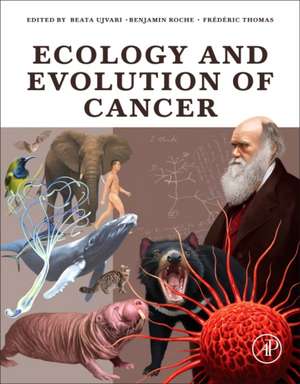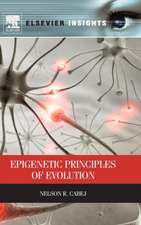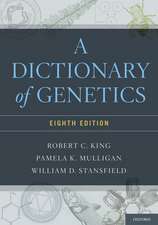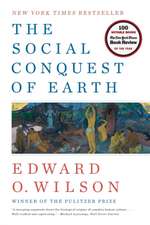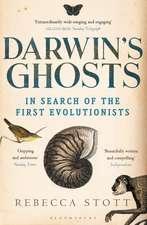Ecology and Evolution of Cancer
Editat de Beata Ujvari, Benjamin Roche, Frederic Thomasen Limba Engleză Paperback – 14 feb 2017
The evolutionary perspective of cancer has gained significant international recognition and interest, which is fully understandable given that somatic cellular selection and evolution are elegant explanations for carcinogenesis. Cancer is now generally accepted to be an evolutionary and ecological process with complex interactions between tumor cells and their environment sharing many similarities with organismal evolution. As a critical contribution to this field of research the book is important and relevant for the applications of evolutionary biology to understand the origin of cancers, to control neoplastic progression, and to prevent therapeutic failures.
- Covers all aspects of the evolution of cancer, appealing to researchers seeking to understand its origins and effects of treatments on its progression, as well as to lecturers in evolutionary medicine
- Functions as both an introduction to cancer and evolution and a review of the current research on this burgeoning, exciting field, presented by an international group of leading editors and contributors
- Improves understanding of the origin and the evolution of cancer, aiding efforts to determine how this disease interferes with biotic interactions that govern ecosystems
- Highlights research that intends to apply evolutionary principles to help predict emergence and metastatic progression with the aim of improving therapies
Preț: 455.89 lei
Preț vechi: 576.08 lei
-21% Nou
Puncte Express: 684
Preț estimativ în valută:
87.26€ • 90.75$ • 73.12£
87.26€ • 90.75$ • 73.12£
Carte tipărită la comandă
Livrare economică 06-20 martie
Preluare comenzi: 021 569.72.76
Specificații
ISBN-13: 9780128043103
ISBN-10: 0128043105
Pagini: 290
Dimensiuni: 216 x 276 x 18 mm
Greutate: 0.8 kg
Editura: ELSEVIER SCIENCE
ISBN-10: 0128043105
Pagini: 290
Dimensiuni: 216 x 276 x 18 mm
Greutate: 0.8 kg
Editura: ELSEVIER SCIENCE
Cuprins
1. The Evolutionary Origins of Cancer and of Its Control by Immune Policing and Genetic Suppression
2. Cancer Prevalence and Etiology in Wild and Captive Animals
3. Infection and Cancer in Nature
4. Pseudohypoxia: Life at the Edge
5. The Genomic Landscape of Cancers
6. The Epigenetic Component in Cancer Evolution
7. Evolution of Cancer Defense Mechanisms Across Species
8. Coevolution of Tumor Cells and Their Microenvironment: “Niche Construction in Cancer
9. Evolutionary Perspective of Tumorigenesis and Antitumor Immunity: A Comparative Approach
10. The Response of Cancer Cell Populations to Therapies
11. Ecology of the Metastatic Process
12. Transmissible Cancer: The Evolution of Interindividual Metastasis
13. Cancer in Animals: Reciprocal Feedbacks Between Evolution of Cancer Resistance and Ecosystem Functioning
14. Applying Tools From Evolutionary Biology to Cancer Research
15. Understanding Ancient Legacies to Expose and Exploit Cancer’s Evolutionary Vulnerabilities
16. Atavism Theory—An Introductory Discourse
17. Toward an Ultimate Explanation of Intratumor Heterogeneity
18. Obstacles to the Darwinian Framework of Somatic Cancer Evolution
19. Cancer as a Disease of Homeostasis: An Angiogenesis Perspective
20. Dormancy: An Evolutionary Key Phenomenon in Cancer Development
21. Controlling Rogue Cells in Cancer and Bacterial Infections
22. Searching for a Cancer-Proof Organism: It’s the Journey That Teaches You About the Destination
23. Ecology, Evolution, and the Cancer Patient
2. Cancer Prevalence and Etiology in Wild and Captive Animals
3. Infection and Cancer in Nature
4. Pseudohypoxia: Life at the Edge
5. The Genomic Landscape of Cancers
6. The Epigenetic Component in Cancer Evolution
7. Evolution of Cancer Defense Mechanisms Across Species
8. Coevolution of Tumor Cells and Their Microenvironment: “Niche Construction in Cancer
9. Evolutionary Perspective of Tumorigenesis and Antitumor Immunity: A Comparative Approach
10. The Response of Cancer Cell Populations to Therapies
11. Ecology of the Metastatic Process
12. Transmissible Cancer: The Evolution of Interindividual Metastasis
13. Cancer in Animals: Reciprocal Feedbacks Between Evolution of Cancer Resistance and Ecosystem Functioning
14. Applying Tools From Evolutionary Biology to Cancer Research
15. Understanding Ancient Legacies to Expose and Exploit Cancer’s Evolutionary Vulnerabilities
16. Atavism Theory—An Introductory Discourse
17. Toward an Ultimate Explanation of Intratumor Heterogeneity
18. Obstacles to the Darwinian Framework of Somatic Cancer Evolution
19. Cancer as a Disease of Homeostasis: An Angiogenesis Perspective
20. Dormancy: An Evolutionary Key Phenomenon in Cancer Development
21. Controlling Rogue Cells in Cancer and Bacterial Infections
22. Searching for a Cancer-Proof Organism: It’s the Journey That Teaches You About the Destination
23. Ecology, Evolution, and the Cancer Patient
